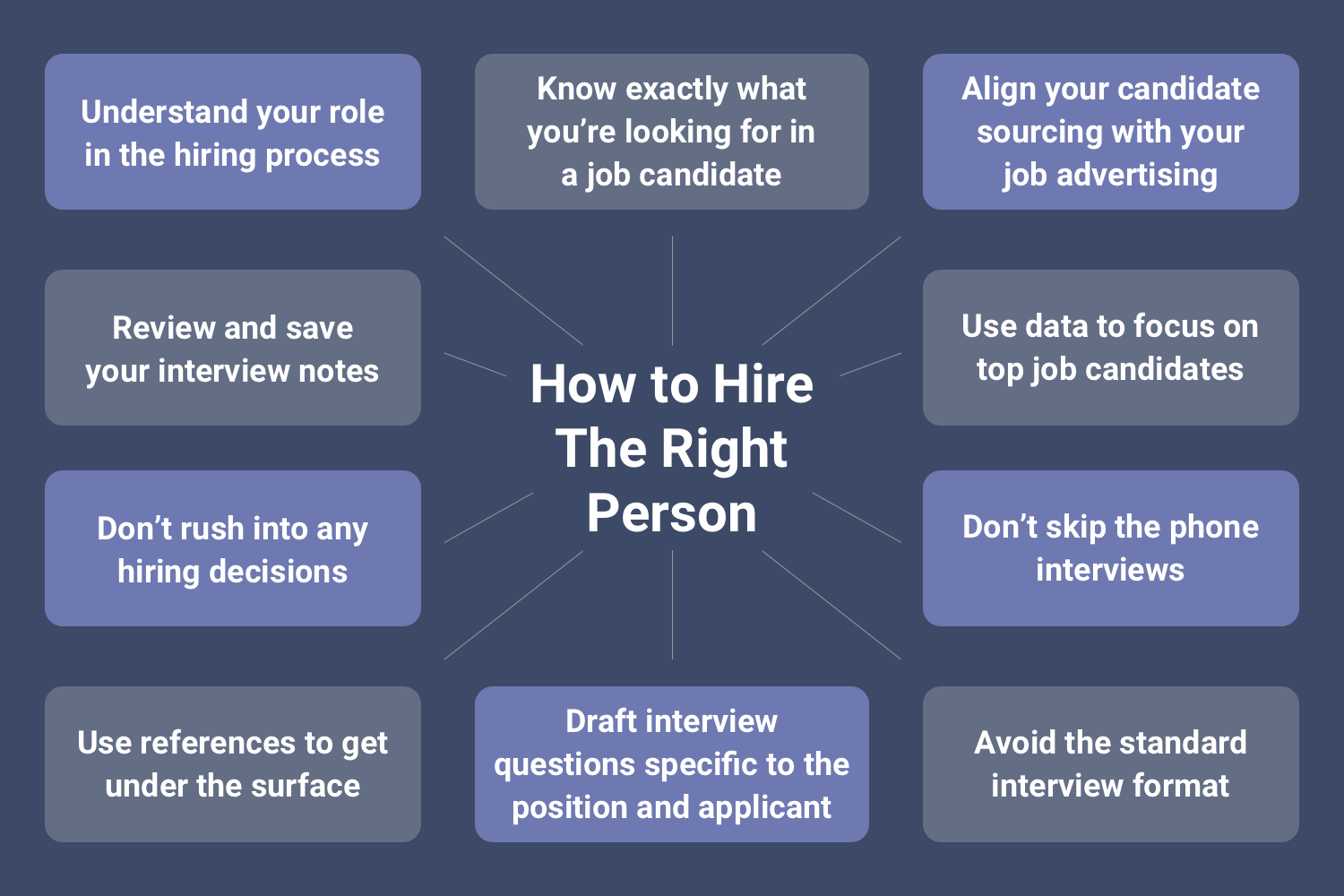
In today's competitive job market, securing the ideal candidate for your team is more critical than ever. "Find the right candidate for you" isn't just a catchphrase; it's a mission. It's about unearthing that exceptional individual who not only meets the job requirements but also embodies your company's values and culture. It's the pivotal factor that can elevate your team's dynamics and drive success.
This comprehensive guide dives deep into the art and science of recruitment, offering a treasure trove of proven strategies, innovative approaches, and insider insights. From crafting compelling job descriptions that attract top talent to leveraging cutting-edge recruitment tools and conducting interviews that truly reveal a candidate's potential, this resource is your compass in navigating the complex landscape of finding the perfect fit.
7 Proven Strategies To Find The Right Candidate For Your Team
Hiring the right candidate for your teamcan be a daunting task, but it's essential for the success of your business. Here are seven proven strategies to help you find the right person for the job:
1. Define Clear Objectives And Requirements
Before you start looking for candidates, it's important to have a clear understanding of the role you need to fill. What are the essential skills and experience required? What are the key responsibilities of the position? What are the desired personal qualities of the ideal candidate?
2. Streamline The Application Process
Make it easy for candidates to apply for the position by using a simple and streamlined application process. Avoid asking for unnecessary information or making the process too lengthy. The more convenient you make it for candidates to apply, the more likely you are to attract top talent.
3. Check References Carefully
Don't forget to check references before making a hiring decision. This will help you verify the candidate's qualifications and get an outsider's perspective on their work performance and character.
4. Conduct Thorough Interviews
The interview is your chance to assess a candidate's skills, experience, and cultural fit. Ask behavioral questions to get a sense of how the candidate has handled similar situations in the past. And be sure to give the candidate an opportunity to ask questions about the role and the company.
5. Screen Resumes And Cover Letters Carefully
When you start receiving applications, take your time to review each resume and cover letter carefully. Look for candidates who have the skills and experience you're looking for, and who can clearly articulate why they're interested in the position.
6. Leverage Multiple Recruiting Channels
Don't rely on just one source to find candidates. Use a variety of channels, such as online job boards, professional networking sites, social media, and employee referrals. This will help you reach a wider pool of potential candidates.
7. Create A Compelling Job Description
Your job description is your first impression on potential candidates, so make sure it's accurate, informative, and engaging. Use strong verbs and concise language to highlight the key responsibilities of the role and the qualities you're looking for in a candidate.
By following these strategies, you can increase your chances of finding the right candidate for your team and make a lasting investment in your company's success.
Finding The Right Job Candidates In 4 Simple Steps
Here is a summary of the four simple steps to finding the right job candidates:
Step 1 - Align With Hiring Team
The first step is to get everyone on the hiring team on the same page about what they are looking for in a candidate. This includes discussing the specific skills and experience required for the role, as well as the desired personality traits and cultural fit.
Step 2 - Interview Top Performers
Once you have a clear understanding of what you are looking for, interview some of your top performers in the position you are trying to fill. This will help you to identify the qualities and behaviors that make these employees successful, and you can use this information to inform your hiring criteria.
Step 3 - Craft Candidate Persona
Based on the information you gathered from the hiring team and the top performers, create a candidate persona. This is a detailed description of your ideal candidate, including their skills, experience, personality, and cultural fit.
Step 4 - Review With Stakeholders
Once you have a draft of your candidate persona, share it with the hiring team and other stakeholders to get their feedback. This will ensure that everyone is on the same page about what you are looking for and that the candidate persona is realistic and achievable.
What To Consider When Hiring?
The greatest method to ascertain whether a potential new hire is a good fit for the position is through a carefully thought out and performed interview technique.
Is the applicant in front of you qualified for the position? Given the volatility of the market, how can one accurately anticipate all the skills and qualities they will require six months or a year from now?
1. How Highly Adaptive Is The Candidate?
The kind of flexibility, adaptability, and extensive businessknowledge that are required in new dynamic work contexts are not present in older command and control work environments. Even with the correct credentials, desirable applicants need to be quick, adaptable, and enthusiastic learners. These are some inquiries that you should make.
Because the nature of work is evolving and must continually reconceptualize the market, reorganize, and divide, you must ask pertinent interview questions in addition to internal ones to find out if the candidate possesses the qualities you need to expand your company and deal with change on a regular basis.
2. Do You Want A Learner Like This On Your Team?
The CEO and founder of Levenger, a company that makes equipment for reading, Steve Leveen, says he searches for collectors when hiring new employees. "What they gather actually doesn't matter," he asserts."Just the fact that they have passions and are genuinely interested in something."
Excellent candidates will also have knowledge they seek out on their own because they are motivated and quick learners. What do they consist of? When the candidate describes themselves, do you become excited?
3. Do They Consider Education To Be Fun?
Many of us were taught in school that making errors was a sign of incompetence. According to recent studies, making mistakes is necessary for adaptive learning because you can't advance without trying new things.
Highly skilled students commit many errors and are able to gain valuable lessons from them. Seek out a candidate who can articulate three failures with ease, along with the lessons they learned. If they are reluctant to admit their mistakes, this should be taken seriously.
4. Do They Confess To Making Errors?
According to business analyst Barbara Glanz, "spirited workplaces" are full of people who are creative communicators, affirming of others and aware of how their interactions with others make people feel.
Because they are perceptive about their influence on others and imaginative in their connections, enthusiastic people tend to generate pleasant feelings and productive energy for their ideas and activities. This is the vitality your business needs. When you converse with this candidate, do you sense it?
5. Do They Have A Passion For People And Connections?
An essential new talent in an increasingly downsized society is learning how toget by with less. This involves utilizing, owning, and consuming less material goods. Can the applicant use the post-it note on both sides? Do they genuinely believe that the goal of getting more for less is morally right because it benefits everyone?
6. Do They Handle Resources Well?
Hiring and keeping beautiful coworkers who are excellent collaborators is a priority at Netflix, where the company culture is all about freedom and responsibility to lead the market in innovation. While some companies can put up with "brilliant jerks," the cutthroat business world of today requires people who can work well in teams and are very cooperative.
According to Kathryn Alexander of Ethical Impact, you don't want to recruit a "swan," someone who is so independent and creative that they find it hard to work with others, or an "eagle," someone who is solely focused on themselves and their own competitive advantages. This entails looking for a candidate who not only has the interpersonal qualities to strengthen the team but also understands how diversity and collaboration improve thinking.
7. Do They Function Well In A Team?
Today, every workplace is overrun with mountains of data and an excess of information. Does the applicant show that they have the ability to recognize patterns and discern significant trends in data, workflows, and organizational crises? In the past, workers had to be able to react to changes in the market in an efficient manner.
However, in the present, workers must be able to anticipate changes in the market and share their knowledge with others. From the front desk receptionist to the regional sales manager to IT security, you need to hire people with this capacity to recognize trends in large amounts of data.
8. Are They Able To Identify Patterns In Diverse Data?
What more information do they require? Do they have a lot of questions? Todd Kashdan writes in a recent book about curiosity that curiosity is about "seeking out and appreciating the new." It's better to embrace uncertainty than to strive frantically for certainty. A great worker today must also be a great learner, therefore the secret to high output and innovative thinking is to be intensely interested.
9. Do They Have An Abundant Curiosity?
Everyone is aware of the necessity of researching the position before attending a job interview. But what do they "hear" about the company or your work once they're in the interview? Can they listen, process, and pose meaningful inquiries regarding the core of your company? Asking a candidate well-crafted interview questions can reveal a lot about their thought process and ability to identify and address market issues as they arise.
10. Do They Pose Excellent Queries?
Since most organizational systems are currently characterized by change, you want someone who can quickly adjust to changes in the workplace. Can the candidate provide you with examples of how, in their previous role, they were able to adapt, adjust, and grow in the workplace? When the economic winds shift, flexibility, the ability to adopt new roles and ways of thinking, are essential.
The Correct Candidate Can Be Hired Today
It's not their skills that you are recruiting. No applicant is entirely competent or possesses the ideal set of talents for the position. Who is this person in front of you, and is they someone you want on your team in the wake of a company redesign, reorganization, or business crisis?
Do you respect their customs and values? Do you think they'll act morally? Each employee will currently need to "learn into" whatever position they are employed for. You can trust your instincts, but it's also important to ask the correct questions.
Ask Yourself Questions About The Candidate Before You Hire Them
Before hiring a candidate, it's crucial to carefully evaluate their suitability for the role and your company culture. Ask yourself these questions:
- Are they eager to learn and motivated to grow within the company?
- Will they fit in with the team's dynamics and contribute positively to the work environment?
- Do their values align with the company's mission and principles?
- Are they open to mentorship and guidance to further their skills and knowledge?
- Are they committed to long-term careergrowth within the organization?
- Can they effectively fulfill the job requirements and responsibilities?
Thorough screening involves taking detailed notes during and after interviews while adhering to data privacy regulations. Use competency-based questions and the STAR method to assess their leadership, communication, and conflict-resolution skills. Explore their passions outside of work to gain insights into their personalities and cultural fit.
By carefully considering these factors, you can make informed hiring decisions that align with your company's needs and foster a thriving work environment.
Find The Right Candidate For You - FAQ's
How Do I Find A Suitable Candidate?
- Make Your Brand's Voice Shine
- Leverage Employee Referrals
- Check Their Certifications
- Vet Candidates Using Multiple Methods
- Give Them A Paid Test
- Set Up 'Red Flag' Questions
- Recruit From Industry EventsAnd Fairs
- Post On Professional Social Media Platforms
How Do You Say You Are The Right Candidate?
You might explain that you are particularly motivated or that you are known for going above and beyond for your employers. A second way to answer is to emphasize your unique skills. If you have skills that make you a strong candidate (especially if not many people have those skills), mention them.
What Makes You Best Candidate For This Job?
When possible, give concrete examples of your skills to demonstrate how you'll bring value to the company. Tie your response to company goals. Mention specifically how you will improve the company with your unique qualifications. Focus on yourself.
Conclusion
Hiring the right candidate is crucial for any organization's success. It requires a strategic approach that involves carefully defining the role, crafting an enticing job description, leveraging multiple recruiting channels, thoroughly screening resumes and cover letters, conducting comprehensive interviews, checking references diligently, and making a prompt hiring decision.
By following these proven strategies, companies can effectively identify and attract top talent, ensuring their teams are equipped with the necessary skills, experience, and cultural fit to drive organizational growth and achieve long-term objectives.


